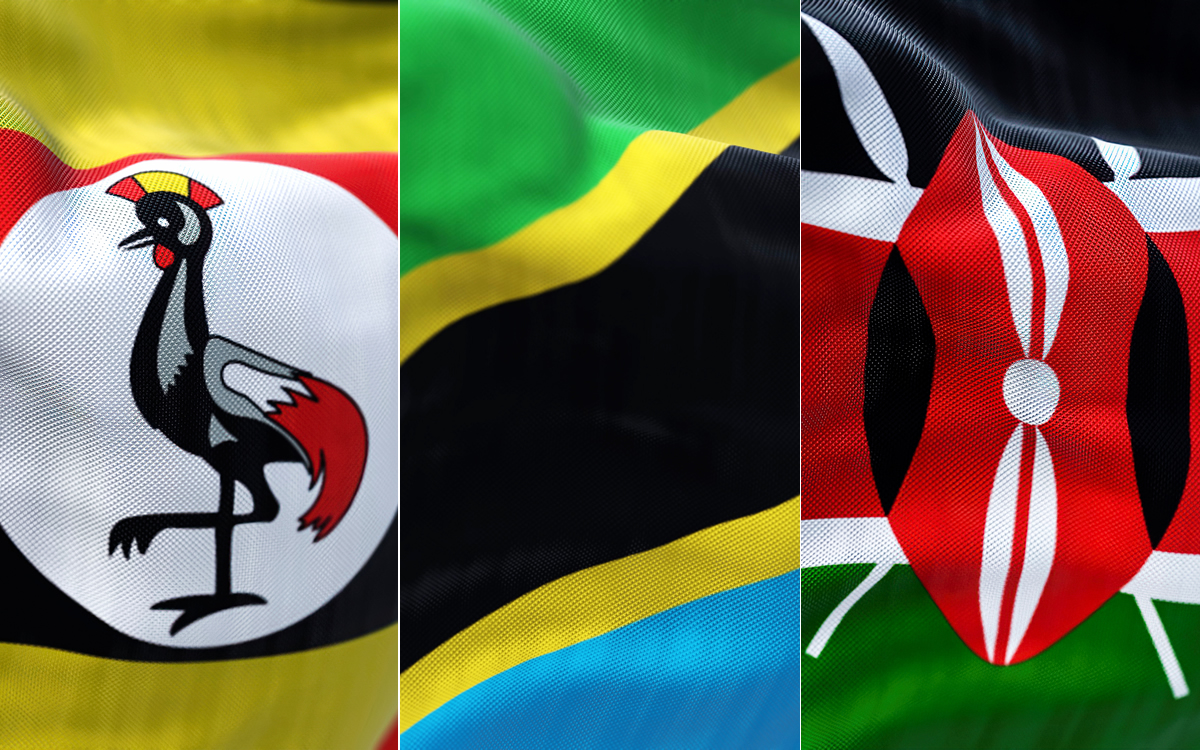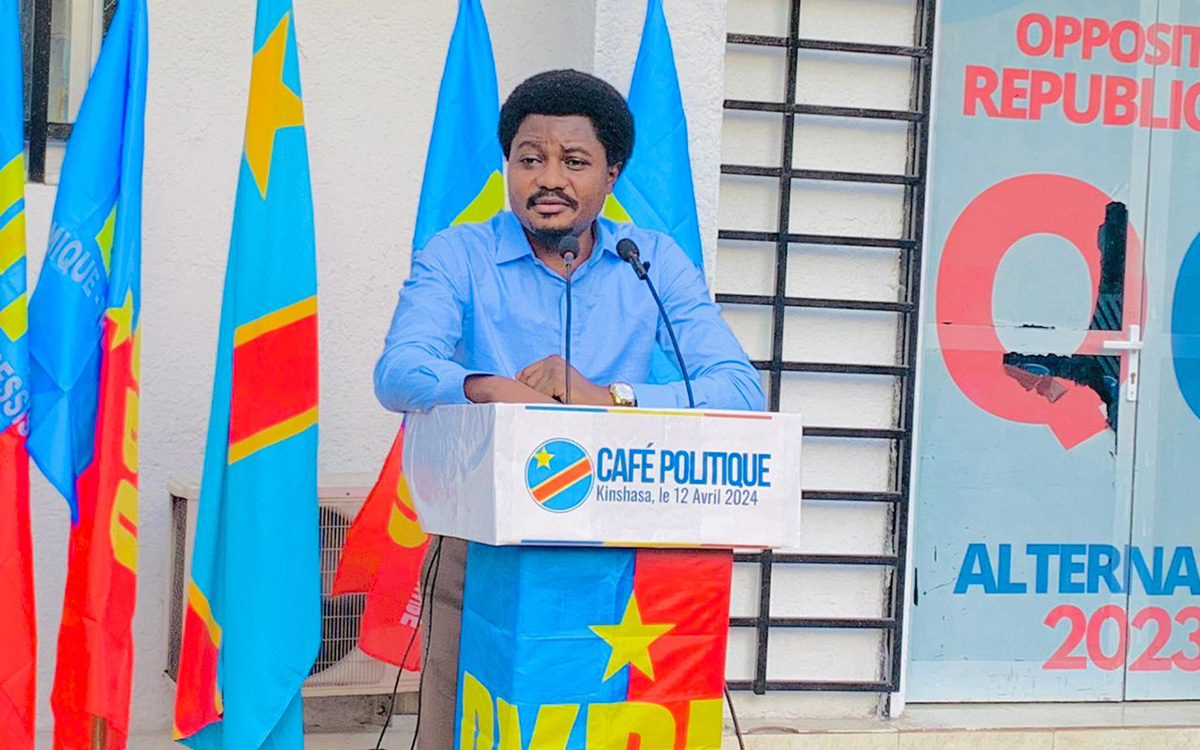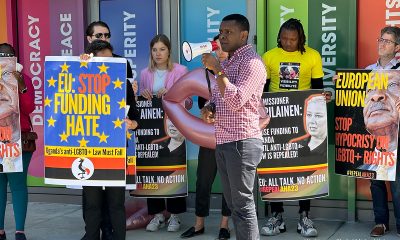Africa
Uganda, Kenya, Tanzania move to further curtail LGBTQ rights
Ugandan MPs considering another anti-homosexuality bill

Three East African countries are tightening the noose on the so-called promotion of homosexuality through new laws and banning LGBTQ-specific content.
Lawmakers in Uganda and Kenya have introduced bills that would curtail the promotion of LGBTQ-specific activities with stiff penalties above their respective penal codes that criminalize consensual same-sex sexual relations. Tanzania has recently banned LGBTQ-specific books.
Uganda’s Anti-Homosexuality Bill, 2022, would sentence anyone who identifies with “lesbianism, gay, transgender, queer or any other sexual or gender identity contrary to the binary categories of male and female” to 10 years in prison.
The proposed law that was set to be tabled any time after its postponement on Wednesday for further preparation would impose a 5-year prison sentence or a fine of around $27,000 or both to anyone who is found guilty of promoting homosexuality in Uganda. The measure’s definition of promotion includes production, procuring, marketing, broadcasting, disseminating using electronic devices, publishing LGBTQ pornography and funding or sponsoring homosexuality.
Uganda’s latest move follows a growing number of LGBTQ-specific activities in the country that include the painting of rainbow colors at a children’s park in January that a local council removed because it went “against the norms of the people of Uganda.”
Moreover, Uganda’s NGO Bureau, which monitors NGOs that operate in the country, in January recommended a new law that “prohibits the promotion of LGBTQ activities in the country.”
Also, the move results from the Church of England’s decision earlier this year to allow its priests to bless same-sex couples. This angered the Anglican Church of Uganda and Muslims who called upon MPs to crack down on homosexuality through legislation.
Anyone convicted of providing a house, a brothel or any other place in which LGBTQ-specific activities can take place could face up to seven years in jail under the new bill.
“Where the offender is a corporate body or a business or an association or a non-governmental organization, on conviction its certificate of registration shall be canceled and the director, proprietor or promoter shall be liable to two years imprisonment on conviction,” the bill reads.
Anyone found guilty of conducting a same-sex marriage could face up to two years in prison and the business that hosts such a ceremony could lose their business license.
The Office of the U.N. High Commissioner for Human Rights has cautioned Uganda’s Parliament against proceeding with the bill, while noting that the “State has a duty to ensure full protection of all people from violence and discrimination regardless of sexual orientation or gender identity.”
Frank Mugisha, a Ugandan LGBTQ and intersex rights activist, has raised concerns about a rising number of homophobic attacks committed by people and security officials in the country since January.
“The LGBTQ community continues to face a harsh operational environment, an increase in direct and indirect attacks, and surveillance in its spaces. This has made it difficult for LGBTQ organizations to do advocacy and deliver services to the communities because of the fear of being arrested by security agencies,” Mugisha said in a statement.
He has documented dozens of harassment and assault incidents to LGBTQ and intersex people, including one on February 18 where a transgender woman residing in Kampala, the Ugandan capital, was assaulted at a friend’s party after discovering her gender.
In Kenya, a bill that would further criminalize and punish people who engage in homosexuality and promote it is poised to be introduced in the country’s Parliament.
“The proposed law intended to further the provision of Article 45 (2) of the Constitution of Kenya and to protect the family will not only consolidate the existing laws relating to unnatural sexual acts but also increase the penalty for those convicted of engaging or promoting the acts to imprisonment for life or consummate sentence,” reads the notification. “Article 45 (2) of the constitution provides that every adult has the right to marry a person of the opposite sex based on the free consent of the parties to start a family, which is recognized as the natural and fundamental unit of society.”
Last week’s Supreme Court ruling that allows an LGBTQ and intersex rights group, the National Gay and Lesbian Human Rights Commission, to register as an NGO after years of court battles with the country’s NGOs Board has elicited criticism from religious leaders, lawmakers, the president and Kenyans themselves.
“We respect our court’s decisions but in Kenya, we have our culture, traditions, and religious beliefs. We can’t go the road of women marrying women or men marrying men. Same-sex marriage will happen somewhere else and not in Kenya,” President William Ruto stated on March 2 at a women’s function in Nairobi, the country’s capital.
Pressure is mounting on the seven Supreme Court judges to reverse the ruling, with Attorney General Justin Muturi vowing to challenge it. Muslim and Christian groups have planned a March 17 protest against the ruling.
The ruling has put the judges in a bind since a Supreme Court decision is final and cannot be appealed in any court in the country. The East African Court of Justice, which is based in Arusha, Tanzania, can consider an appeal.
Critics of the ruling argue that the queer group does not deserve an association, since Kenya’s penal code criminalizes homosexuality and the Supreme Court decision gives leeway for legalizing it from an appeal pending in the country’s second highest court.
Thirteen groups that include the American Jewish World Service, Amnesty International-Kenya, the National Gay and Lesbian Human Rights Commission and the Kenya Human Rights Commission on Thursday issued a joint statement in support of the ruling.
“The judgment has demonstrated the great strides that Kenya has taken to promote the rule of law, democracy, and human rights,” it reads.
The groups insist that granting the LGBTQ and intersex community the right to form associations is in line with the spirit of Kenya’s constitution, which guarantees freedom of expression under Article 33 and freedom of association under Article 27 without any form of discrimination.
Tanzania, which also criminalizes same-sex relations, has joined neighboring Kenya and Uganda in restricting LGBTQ and rights.
President Samia Suluhu last month described LGBTQ rights as “imported cultures” as she cautioned university students against it.
The Tanzanian government recently banned a popular series of children’s books from schools that contain LGBTQ-specific content.
“The Diary of a Wimpy Kid” by U.S. author Jeff Kinney and another book, “Sex Education: A Guide to Life” were removed from libraries in public and private schools. The government has also committed to increasing its surveillance on books with LGBTQ-specific content.
Africa
Upcoming Ugandan Census will not count intersex people
Advocacy group report documents rampant discrimination, marginalization

Uganda’s national Census next month will not count intersex people.
The revelation about the exclusion of intersex Ugandans in the 9-day Census exercise that will begin on May 10 has been confirmed to the Washington Blade by the head of Uganda’s Bureau of Statistics.
UBOS Executive Director Chris Mukiza in response to the Blade’s questions on the issue said the agency has “no business with intersex.”
Their counting could have made Uganda the second African country and the third globally after Australia and Kenya to collect an intersex person’s data in a Census.
Kenya’s 2019 Census determined there were more than 1,500 intersex people in the country.
Uganda had a population of 34.8 million, according to the country’s last Census that took place in 2014.
Intersex people in Uganda are among marginalized groups, subject to stigma and discrimination. The government has yet to recognize them as the third sex and consider them among other minority groups, such as people with disabilities, who enjoy special treatment.
Intersex people cannot be exclusively categorized as male or female for having a biological congenital condition with unique sex characteristics due to inherent and mixed anatomical, hormonal, gonadal, or chromosomal patterns that could be apparent before, at birth, in childhood, puberty, or adulthood.
Mukiza’s position of excluding intersex people in the Census, however, comes amid the prime minister’s office’s demands for inclusivity and equality for all the population. (The Constitutional Court on April 3 refused to “nullify the Anti-Homosexuality Act in its totality.”)
“We recognize that much work remains to be done particularly in addressing the needs of the marginalized and vulnerable communities, promoting inclusive economic growth, and combating climate change,” said Dunstan Balaba, the permanent secretary in the prime minister’s office.
Balaba spoke on April 18 during the National Population and Housing Census prayer breakfast meeting the UBOS convened. Religious leaders and other stakeholders attended it.
President Yoweri Museveni has noted that data from the country’s sixth national Census will be crucial towards achieving the nation’s Vision 2040 and help the government, non-governmental organizations, and donors in providing services to the diverse population.
“It will also provide the basis for planning the provision of social services such as education, health, and transport, among others at the national and local level,” Museveni said as he urged citizens to fully support the Census and provide accurate information.
Uganda has an intersex rights organization, “Support Initiative for People with Atypical Sex Development (SIPD),” which activist Julius Kaggwa founded in 2008 with the support of groups that advocate for children, women, and other marginalized populations.
Some of SIPD’s work as a non-profit, grassroots organization includes community outreach and engagement, sharing reliable information with the society for the protection of intersex people’s rights, and championing the need for organized medical and psychological support.
The organization, through its numerous reports, has decried human rights violations against intersex people that include surgery without consent, discrimination in homes, schools and medical centers, parents abandoning intersex children, and stigma due to lack of legal protection by the government.
Uganda’s Registration of Births and Deaths Act allows a parent or guardian of a child under the age of 21 to change the name or sex at the local registration office. The SIPD, however, maintains this law is discriminatory to intersex people over 21 who want to change their sex characteristics, and want parliament to repeal it.
The intersex rights organization wants the Health Ministry to establish a central registry to register intersex children after they’re born in order to receive support in terms of healthcare, social and legal by the government and other stakeholders as they grow up.
SIPD particularly wants the government to enact a policy that would allow a gender-neutral marker on birth certificates for intersex children to ease any change of sex in the future. The organization also wants the government, through the Education Ministry, to adopt a curriculum that also considers intersex issues in schools and creates a friendly environment for intersex children to learn and graduate like their non-intersex peers.
These demands follow SIPD’s findings that disclosed many intersex children were dropping out of school because of the stigma and discrimination they suffered. The organization has further called on the public-funded Uganda Human Rights Commission to live up to its constitutional mandates of defending human rights by leading the promotion and protection of the rights of intersex people across the country.
SIPD has also challenged religious leaders, who play a key role in Ugandan society and are influential at the local and national level, to promote acceptance of intersex people and to end discrimination against them.
Africa
Ugandan activists appeal ruling that upheld Anti-Homosexuality Act
Country’s Constitutional Court refused to ‘nullify’ law

Twenty-two LGBTQ activists in Uganda have appealed this month’s ruling that upheld the country’s Anti-Homosexuality Act.
The Constitutional Court on April 3 refused to “nullify the Anti-Homosexuality Act in its totality.”
President Yoweri Museveni last May signed the law, which contains a death penalty provision for “aggravated homosexuality.”
The U.S. subsequently imposed visa restrictions on Ugandan officials and removed the country from a program that allows sub-Saharan African countries to trade duty-free with the U.S. The World Bank Group also announced the suspension of new loans to Uganda.
Media reports indicate Sexual Minorities Uganda Executive Director Frank Mugisha and Jacqueline Kasha Nabagesara are among the activists who filed the appeal.
Africa
Congolese lawmaker introduces anti-homosexuality bill
Constant Mutamba’s measure seen as distraction from country’s problems

A member of the Democratic Republic of Congo’s National Assembly who is a leader of the country’s opposition party has introduced a bill that would criminalize LGBTQ people.
Part of the bill that Constant Mutamba, leader of the Dynamic Progressive Revolutionary Opposition platform, has put forth states anyone who “commits a homosexual act (including acts and gestures) will be liable to a 5- or 10-year prison sentence.”
The country in recent years has seen government leaders and civic society target the community with anti-LGBTQ sentiments.
The Superior Council for Audiovisual and Communication, Media Regulatory Authority last June cautioned the media against showing LGBTQ-specific conversations. Several activists have criticized Mutamba’s bill, saying it seeks to move attention away from governance, service delivery and other pertinent issues in the country.
Sirius Tekasala, a human rights activist, said a person’s sexual orientation does not impact issues of governance.
“The proposed bill does not go in the direction of improving the socio-economic life of the Congolese people,” said Tekasala. “It’s not homosexuals who prevent you from doing your job well or from breathing. This is a violation of human rights.”
Mbuela Mbadu Dieudonné, a social analyst and trade unionist, said the bill is just a way of deviating people from the pertinent issues.
“He should suggest how to get the Congolese people out of this precariousness of life which is growing on a daily basis,” said Dieudonné. “When we don’t know the real problems of the Congolese people, he sets himself up as the great director of scenes to distract the Congolese people.”
Many Congolese, however, seem to support the bill and have applauded Mutamba for drafting it.
This is not the first time that such kind of a bill has been drafted.
An anti-homosexuality bill introduced in 2010 would have sentenced people who engage in consensual same-sex sexual relations to between three and five years in prison. The measure, however, did not become law.
Mutamba’s bill, however, may pass with Uganda’s Anti-Homosexuality Act in effect. The country’s Constitutional Court earlier this month upheld it. Burundi, Tanzania and other neighboring countries are also considering similar measures.
Many Congolese people view LGBTQ rights as a Western phenomenon that disregards their religious and cultural beliefs. LGBTQ Congolese are among those who have fled the country and sought refuge in the Kakuma refugee camp in Kenya and other places.
Consensual same-sex sexual relations are not criminalized in the Democratic Republic of Congo, but Congolese law does not recognize same-sex marriages.
-

 South America3 days ago
South America3 days agoDaniel Zamudio murderer’s parole request denied
-

 Maryland4 days ago
Maryland4 days agoMontgomery County police chief discusses arrest of trans student charged with planned school shooting
-

 Politics5 days ago
Politics5 days agoCourt records raise concerns about right-wing TikTok investor’s influence
-

 Commentary4 days ago
Commentary4 days agoWorld ‘isn’t much different today’









